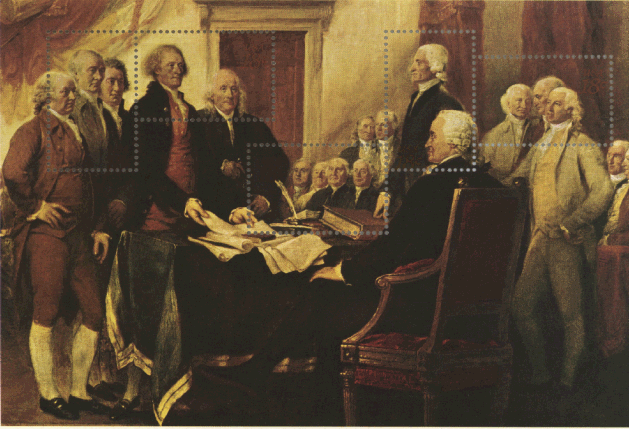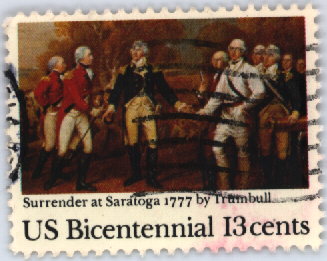Colonies Adopt Declaration Of Independence
The Declaration of Independence -
adopted July 4, 1776 -
not only announced the birth of a new nation, it also set forth a
philosophy of human freedom thenceforth to be a dynamic force
in the entire western world. It rested, not upon particular
grievances, but upon a broad base of individual liberty that could
command general support throughout America. Its political philosophy
is explicit:

"We hold these truths to be selfevident, that all men are created equal, that they are endowed by their Creator with certain unalienable rights; that among these are life, liberty, and the pursuit of happiness. That to secure these rights, governments are instituted among men deriving their just powers from the consent of the governed: that whenever any form of government becomes destructive of these ends, it is the right of the people to alter or to abolish it, and to institute a new government, laying its foundation on such principles, and organizing its powers in such form, as to them shall seem most likely to effect their safety and happiness."
The Declaration of Independence served a purpose far beyond that of a public notice of separation. Its ideas inspired mass fervor for the American cause, for it instilled among ordinary folk a sense of their own importance, inspiring them to struggle for personal freedom, self-government, and a dignified place in society.
The Revolutionary War lasted more than six years, with fighting in every colony. Even before the Declaration of Independence, there were military operations that had an important influence on he outcome of the war - for instance, the crushing of the North Carolina loyalists in February of 1776, and in March the forced evacuation of British forces from Boston.
For many months after independence was declared, the Americans suffered severe setbacks. The first of these was in New York. In the battle of Long Island, Washington's position became unntenable, and he executed a masterly retreat in small boats from Brooklyn to the Manhattan shore. The wind held north and the British warships could not come up the East River. Thus British General William Howe lost a chance to deal the American cause a crushing blow, perhaps to end the war.
Washington, though constantly driven back, was able to keep his forces fairly intact until the end of the year. Important victories at Trenton and Princeton revived colonial hopes, then once more calamity struck. In September 1777, Howe captured Philadelphia, drove the Congress into flight, and left Washington to winter with his men at Valley Forge.
Nevertheless, 1777 also saw the greatest American victory of the war, the military turning point of the Revolution. British General John Burgoyne moved down from Canada with a force designed to gain control of the Lake Champlain-Hudson River line and thus isolate New England from the other colonies. Burgoyne reached the upper Hudson River but, before he could proceed southward, was compelled to wait for supplies until the middle of September.
Ignorance of American geography led him to suppose it would be easy for a raiding force to march across the Hampshire Grants (Vermont) down along the Connecticut River and back, collecting horses, cattle, and wagons along the way for the use of his army-all in a matter of two weeks. For this exploit he chose 375 dismounted Hessian dragoons and about 300 Canadians and Indians. They did not even reach the Vermont line. The Vermont militia met them near Bennington. Few of the Hessians ever returned.
 The Battle of Bennington rallied New England
militiamen,
and Washington sent reinforcements from the lower Hudson. By
the time Burgoyne again put his force in motion, the army of
General Horatio Gates was waiting for him. Led by
Benedict Arnold, the Americans twice repulsed the British. Burgoyne fell
back to Saratoga, and on October 17, 1777, he
surrendered. This
decisive blow of the war brought France to the American side.
The Battle of Bennington rallied New England
militiamen,
and Washington sent reinforcements from the lower Hudson. By
the time Burgoyne again put his force in motion, the army of
General Horatio Gates was waiting for him. Led by
Benedict Arnold, the Americans twice repulsed the British. Burgoyne fell
back to Saratoga, and on October 17, 1777, he
surrendered. This
decisive blow of the war brought France to the American side.
Several groups are involved in re-enacting scenes from the
American Revolutionary War.
American
Revolutionary War Website
